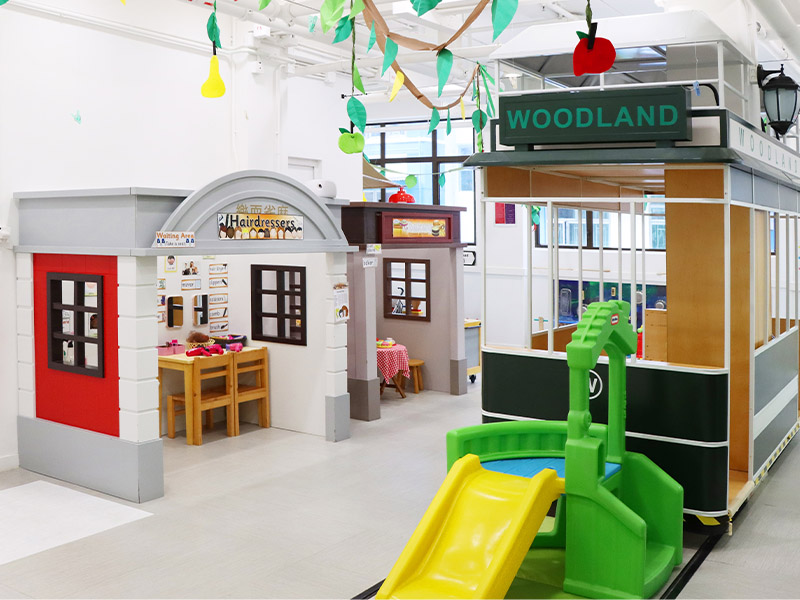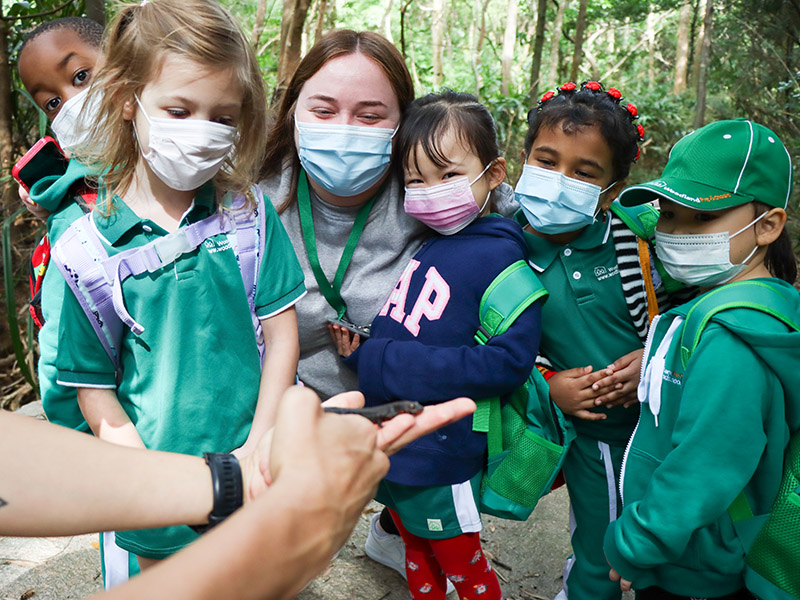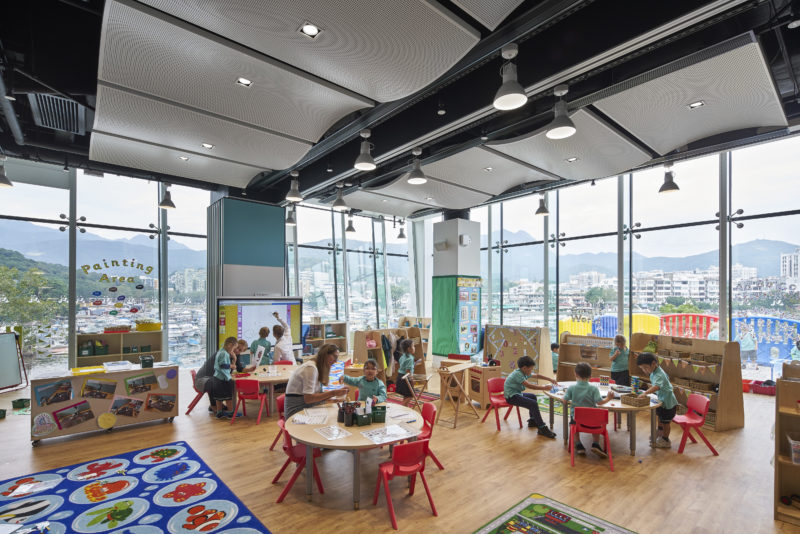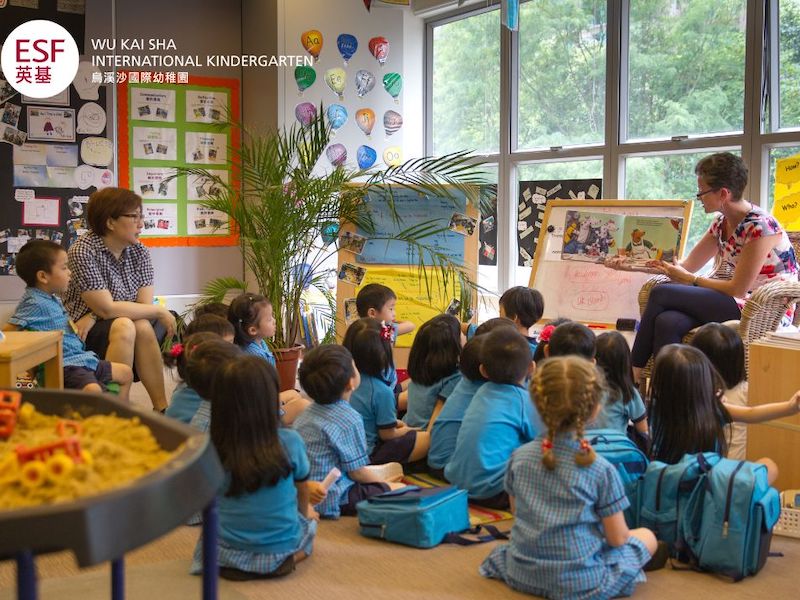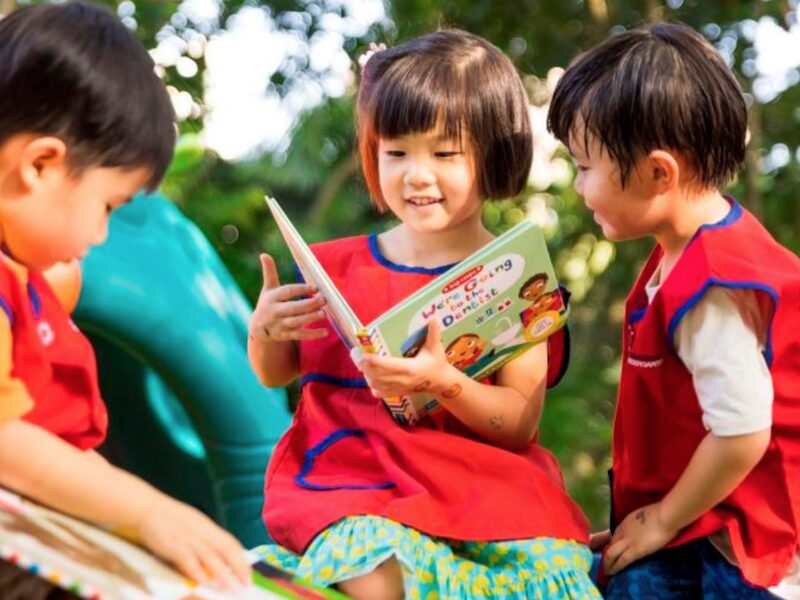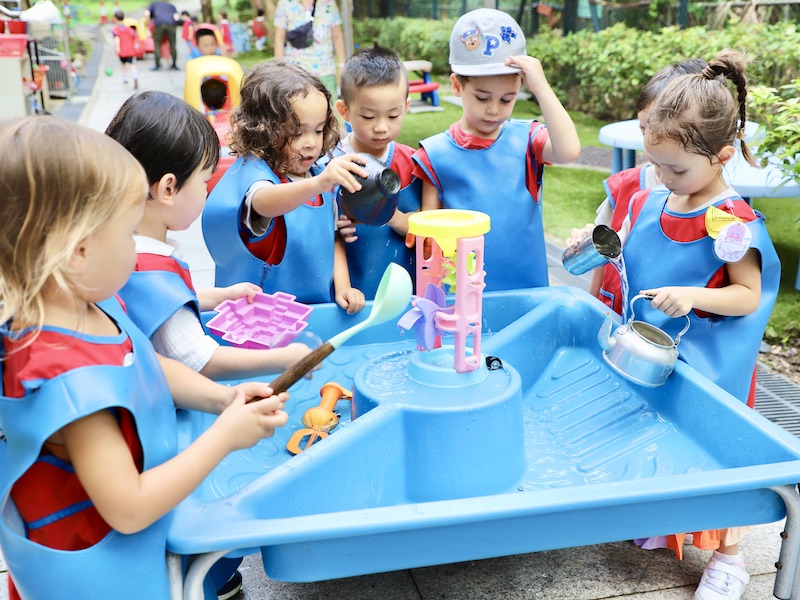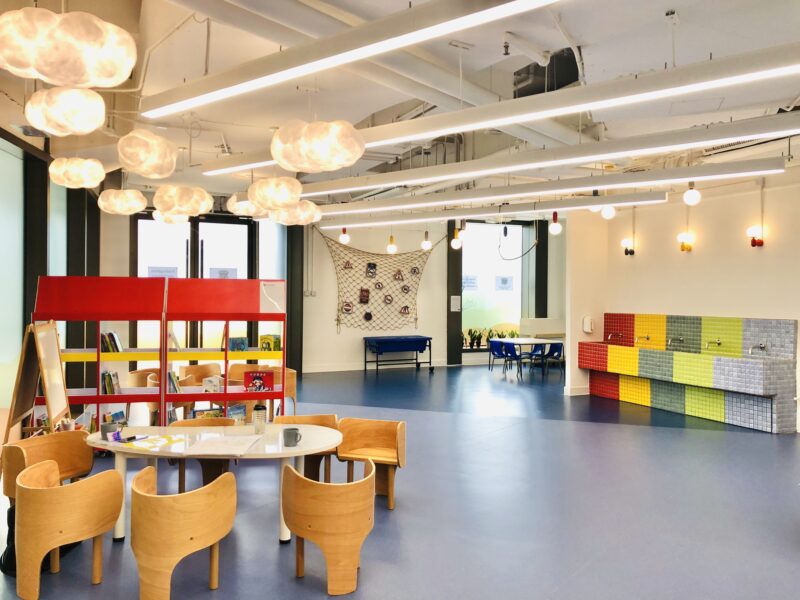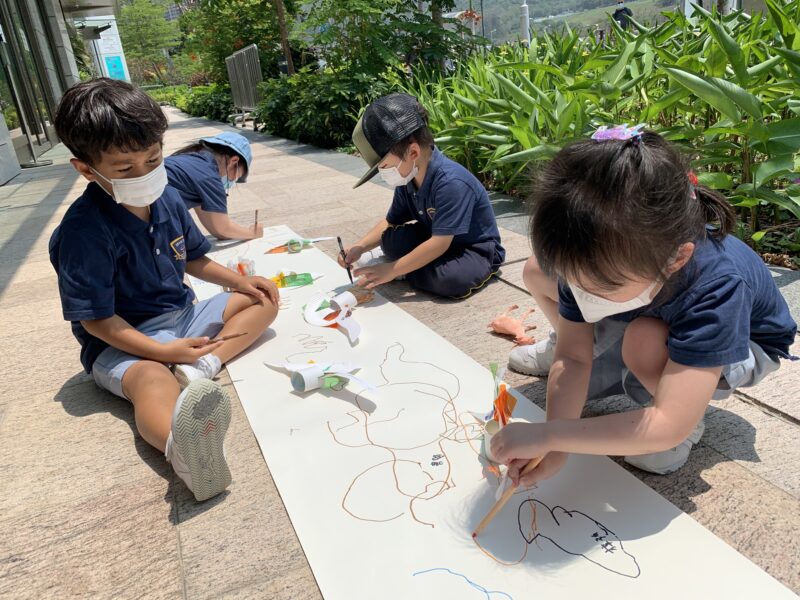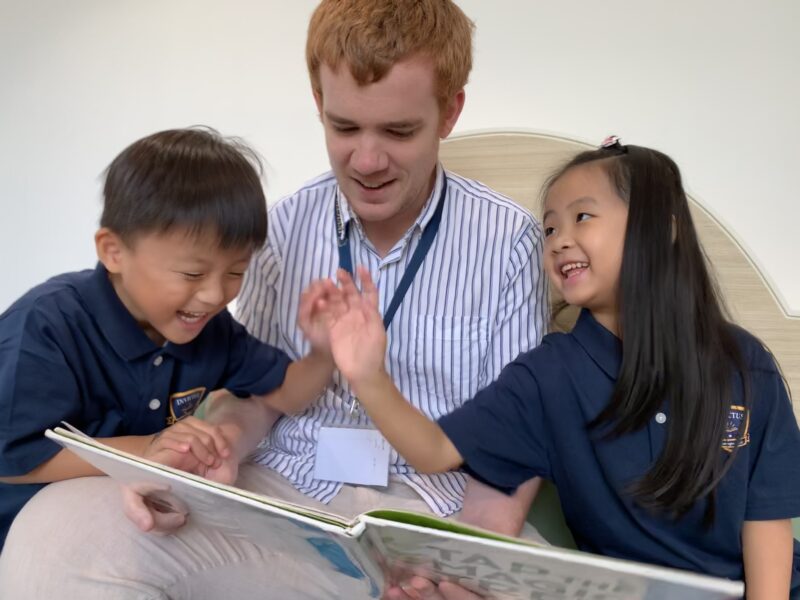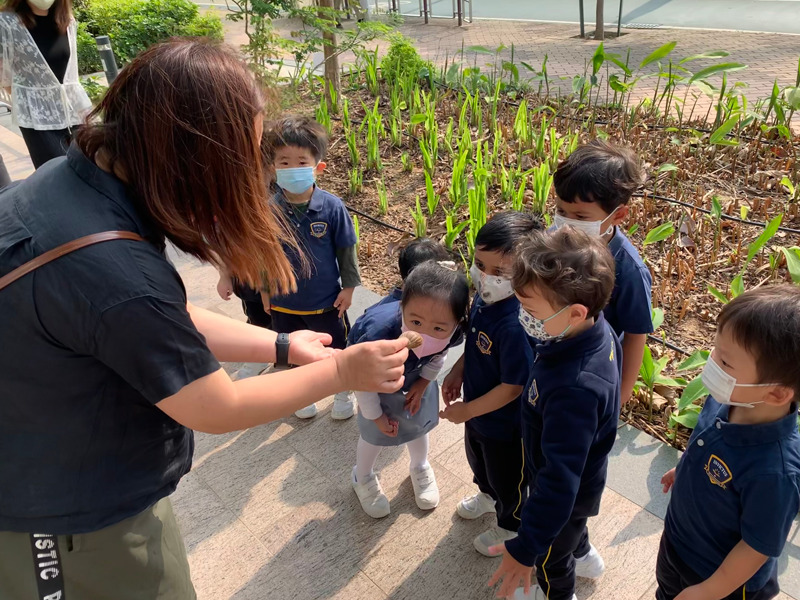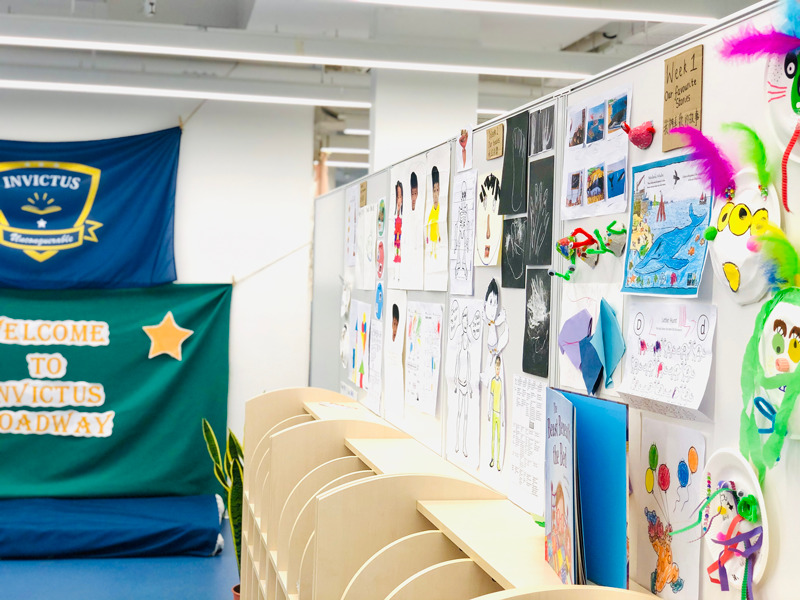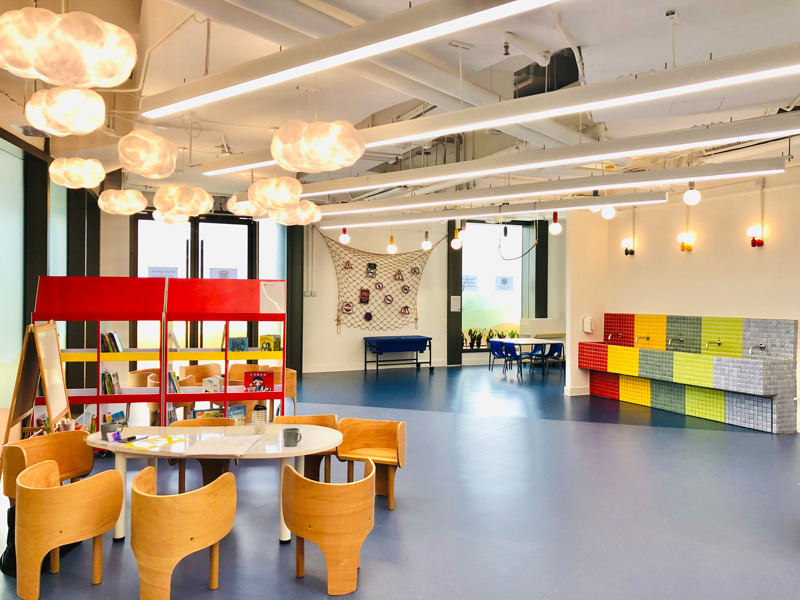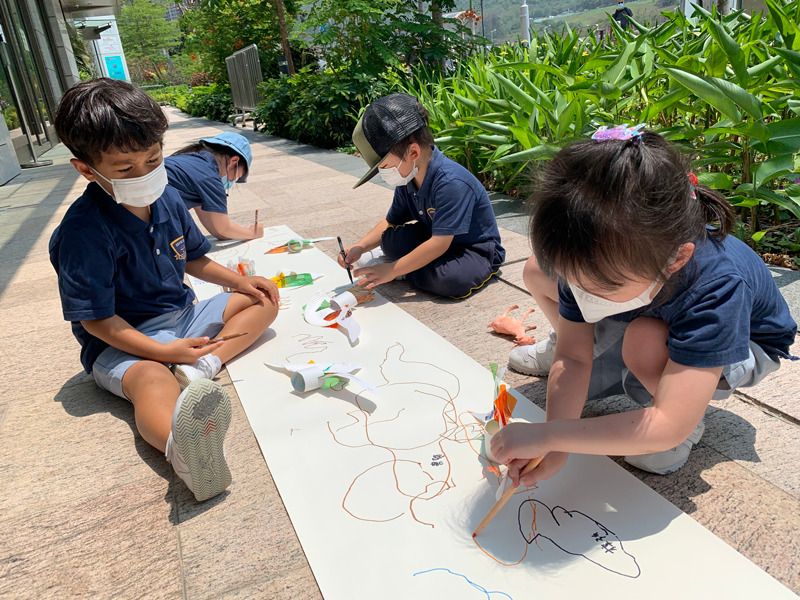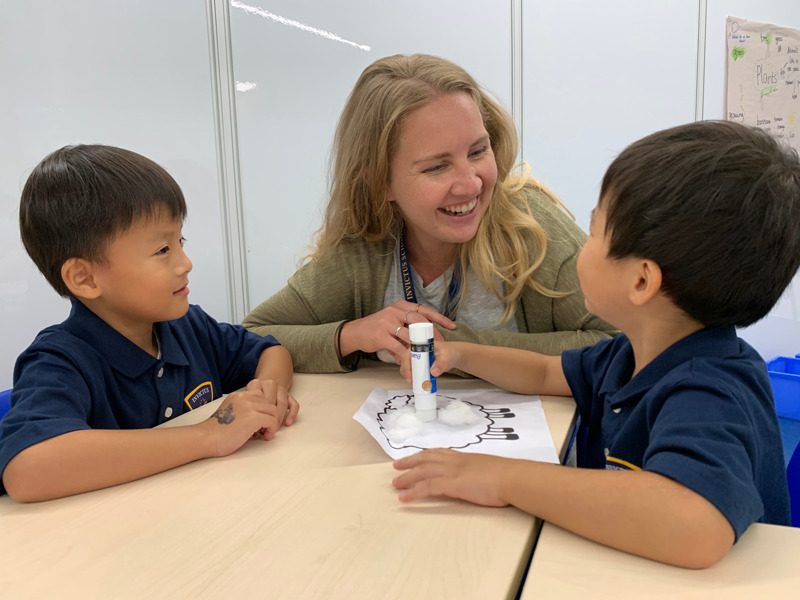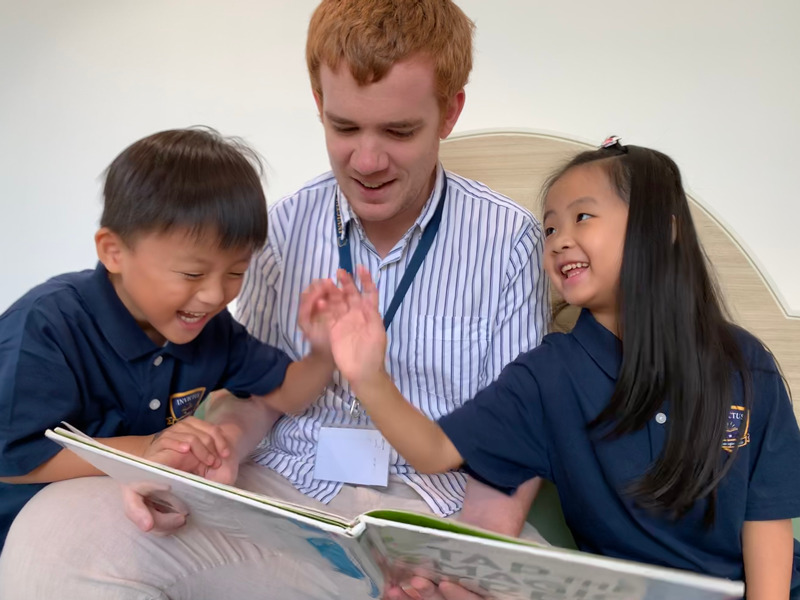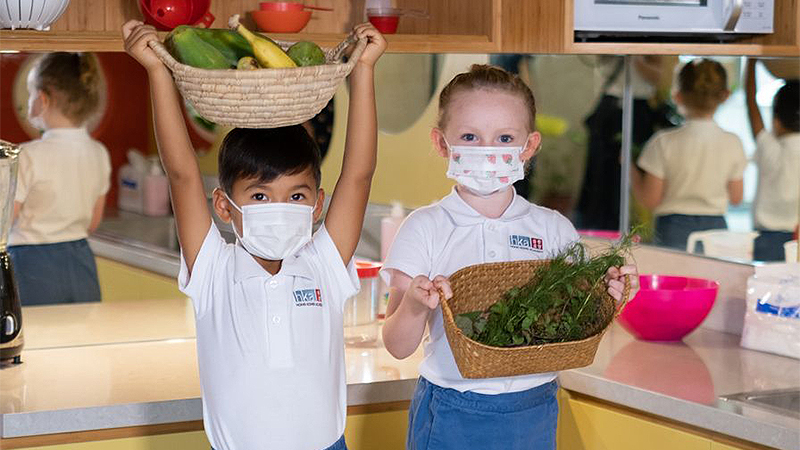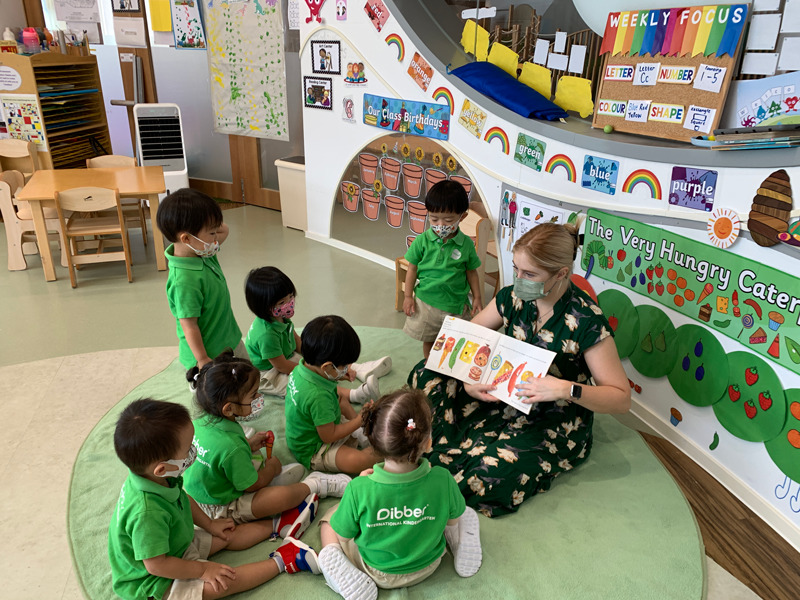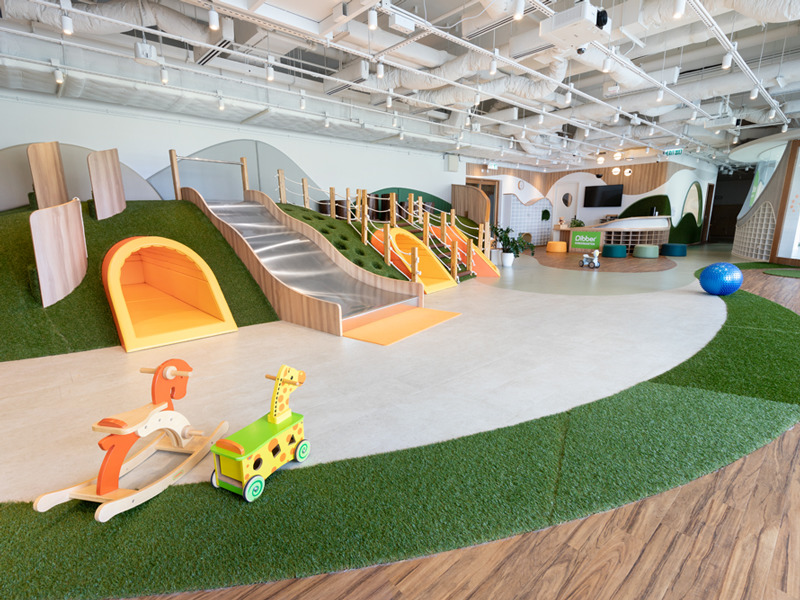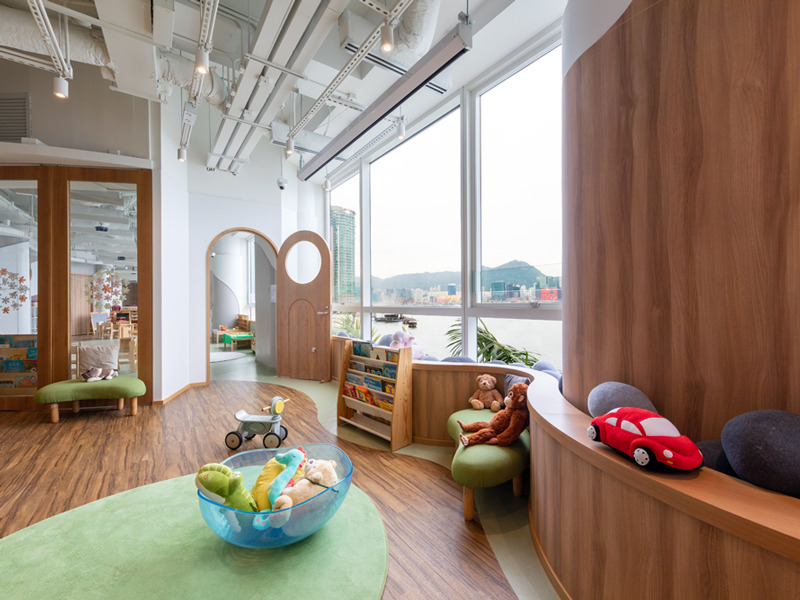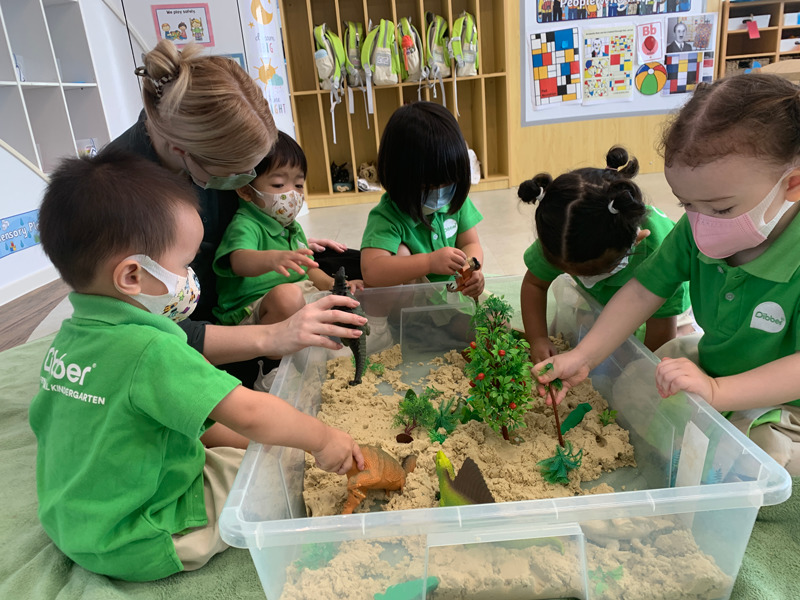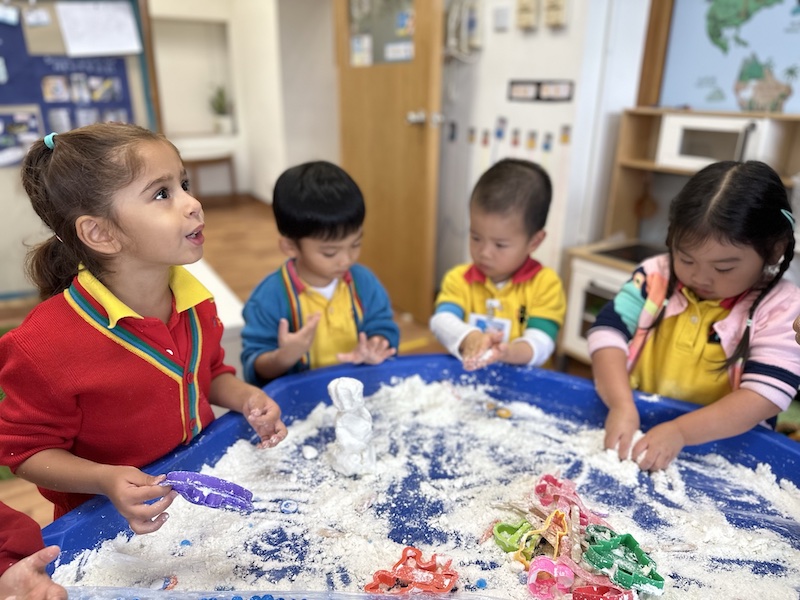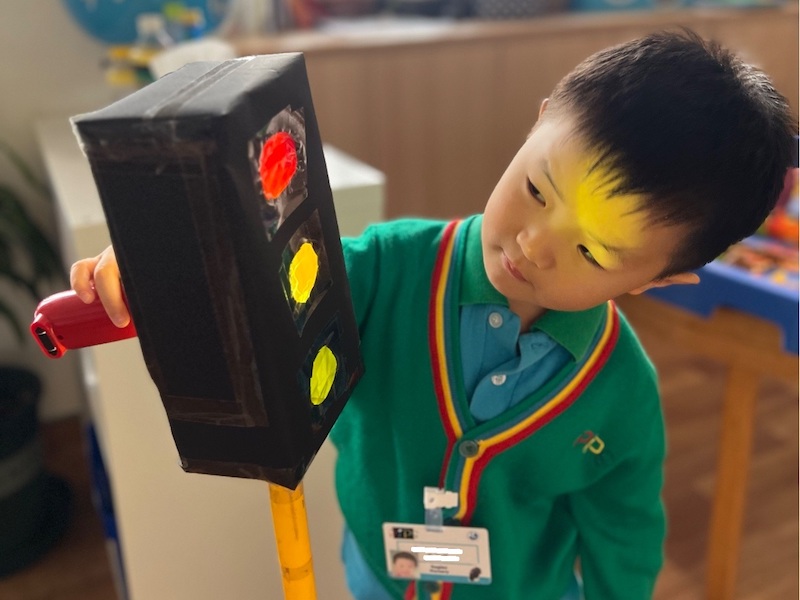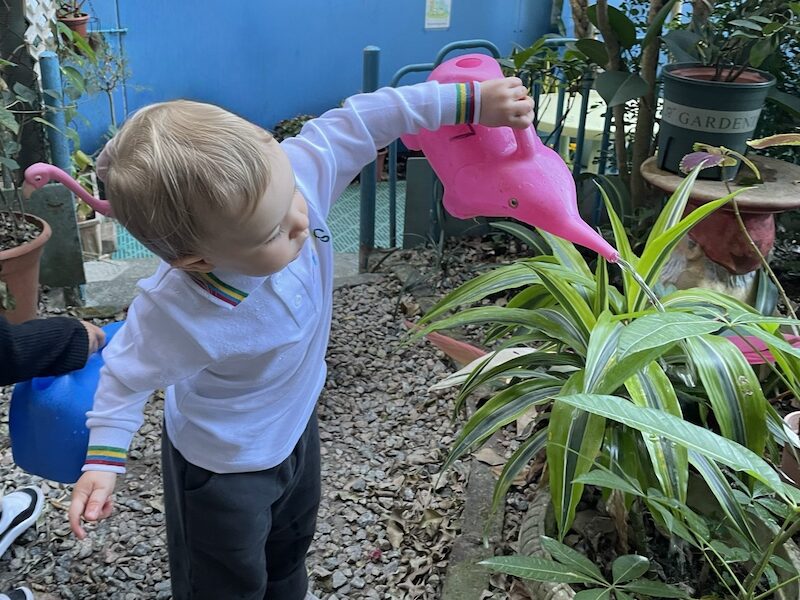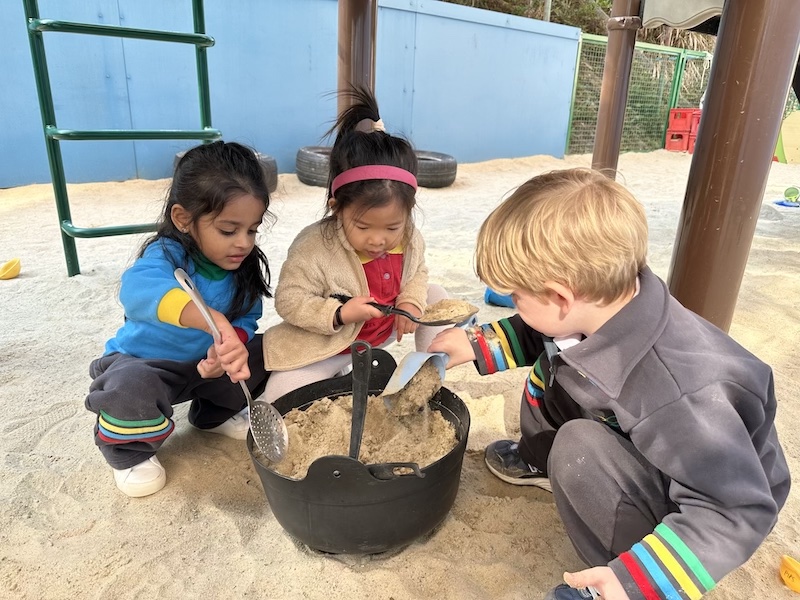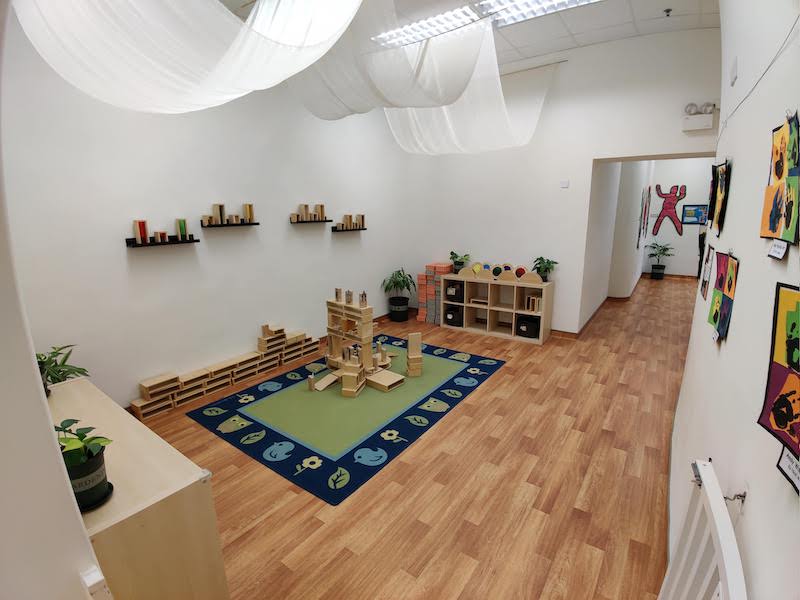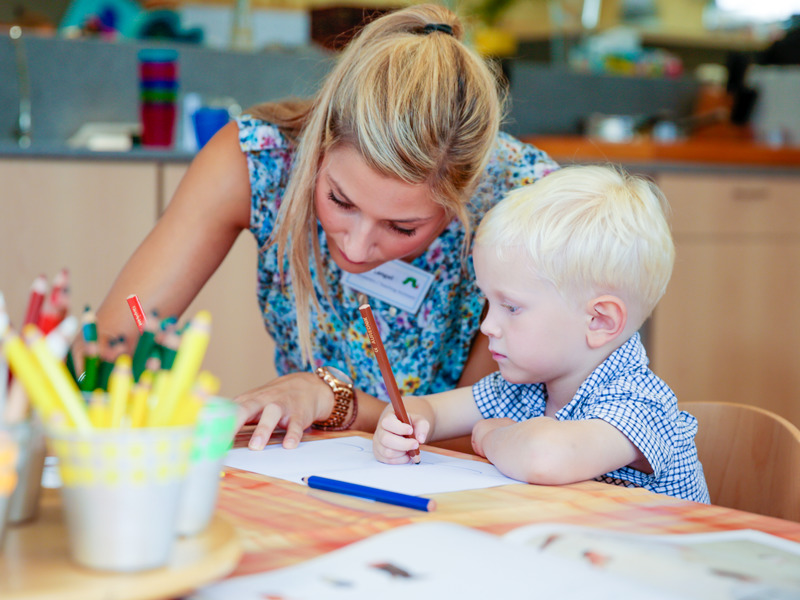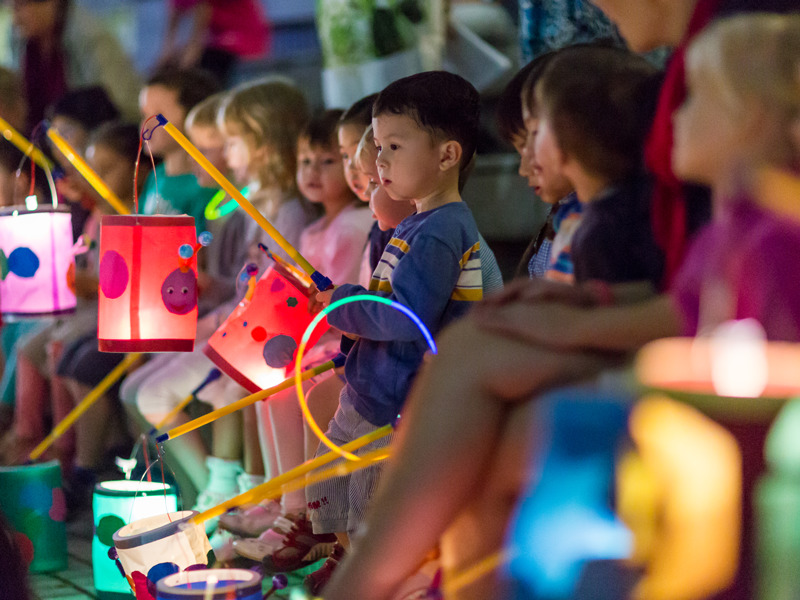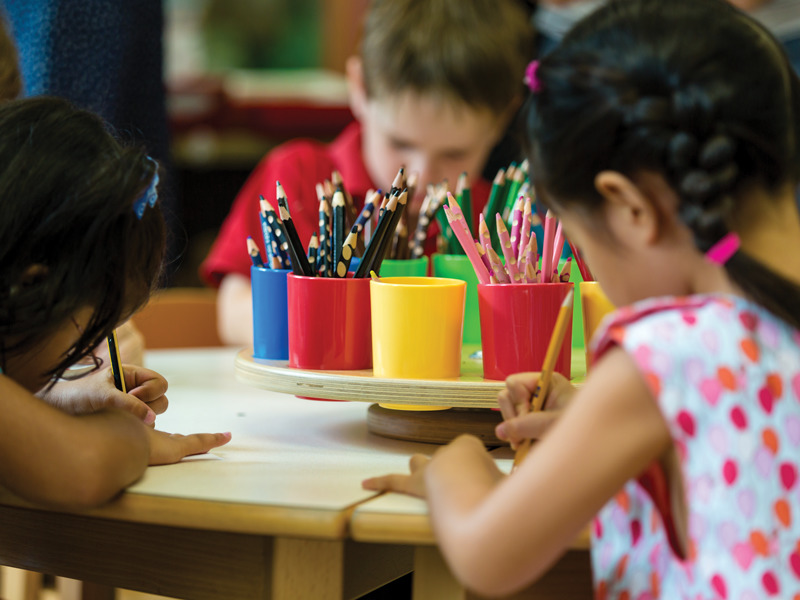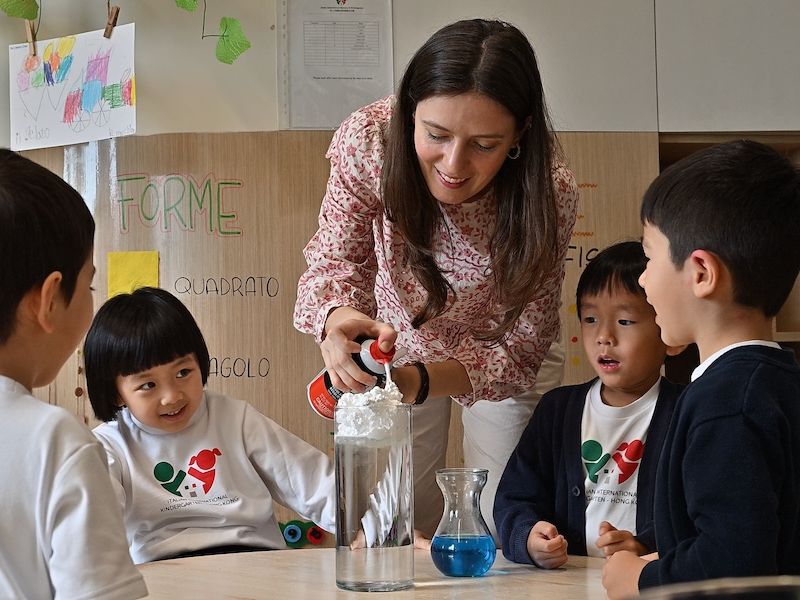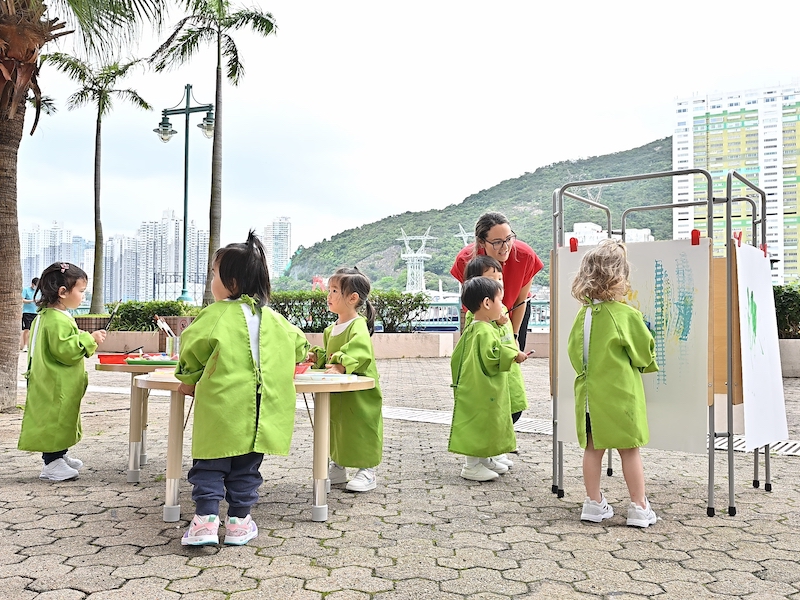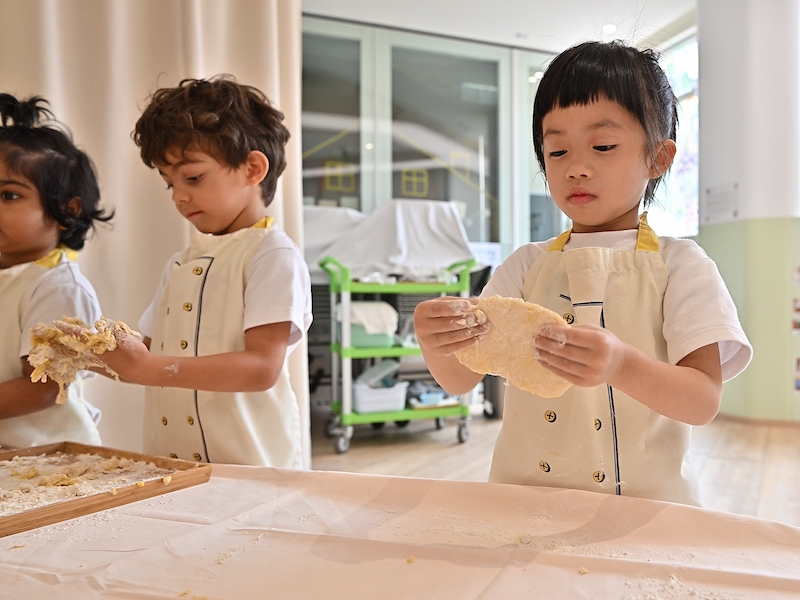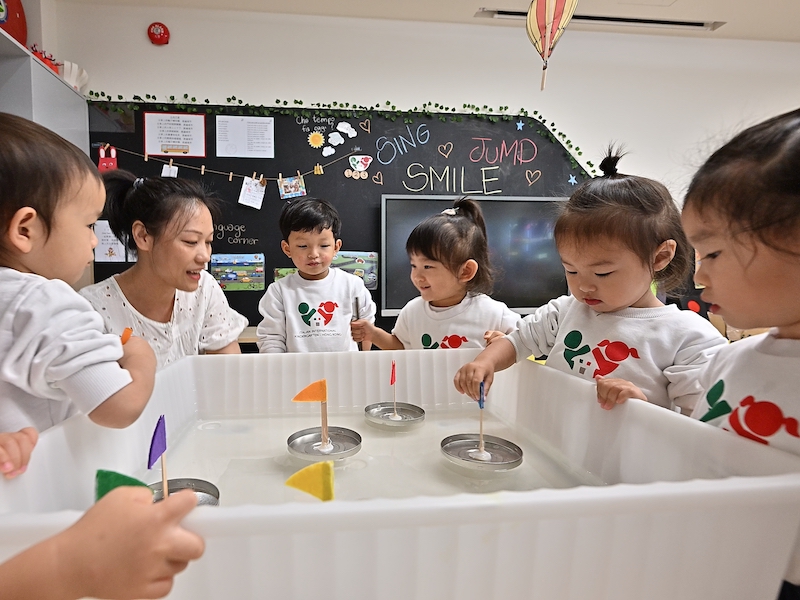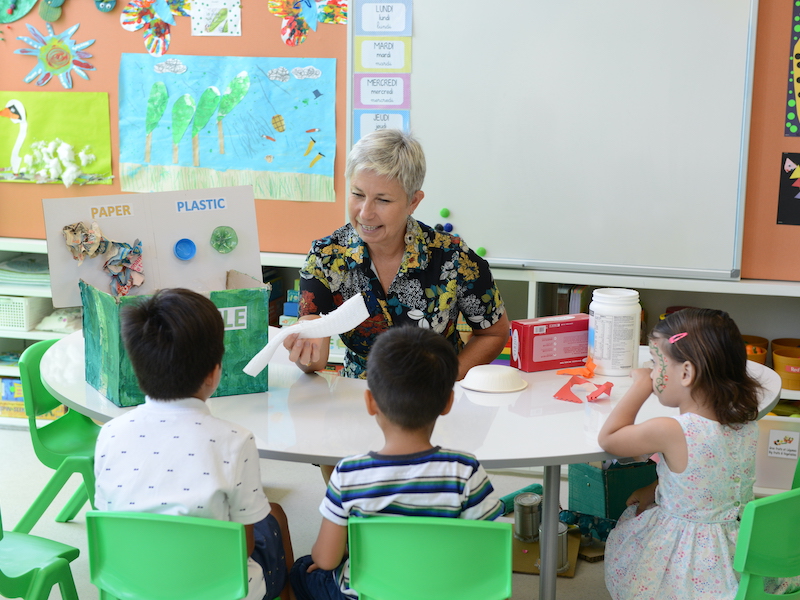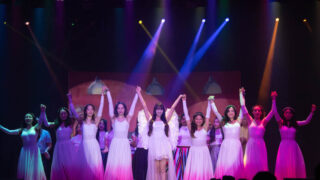We all know how important the early years of learning are for children. That’s why it’s a good idea to look closely at early years programmes and preschool curriculums when considering an international preschool. Choosing the right preschool will make for a smooth transition to primary school, and give you confidence that your child will be learning what’s needed for later on. Other factors to keep in mind include the preschool team’s experience, campus facilities and the focus on play. The following international kindergartens and preschools in Hong Kong have fantastic facilities and opportunities to prepare little ones for ‘big school’ – and the big world!
International Kindergartens and Preschools in Hong Kong List
Malvern College Pre-School Hong Kong
What are some key features of your curriculum and learning approach?
Malvern College Pre-School offers an Educationally Harnessed Play Programme based on the EYFS curriculum, engaging c hildren through both structured and free play and emphasising their inquisitive nature through hands-on activities. Our highly personalised approach to teaching sets a natural foundation for a child’s immersion into primary school.
MCPS is inspired by the Reggio Emilia philosophy. Every day, the team lovingly prepare learning spaces that are designed to be functional and also beautiful, inviting and reflective of a child’s learning. The bilingual curriculum provides equal exposure to both English and Chinese languages and culture; and we’re also one of Hong Kong’s first preschools to operate a fully-fledgedForest-Beach-School Programme.
What activities do children get involved in on a school day?
Malvern pupils learn through both structured and free play, with a balance of child-initiated and adult-led activities. Each half-day session includes two circle times, one in English and one in Mandarin. Then, in “Discovery Time”, pupils engage in free, uninterrupted play, exploring the preschool’s boundless learning opportunities. Regular music, PE and sensory play sessions are also built into the weekly schedule, complemented by outings to parks and playgrounds.
Every two weeks, pupils attend Forest-Beach School at the preschool’s dedicated outdoor learning sites in Sai Kung. With access to both woodland and beach, pupils explore the natural world in a safe and supervised setting, developing collaboration, communication and problem-solving skills. The programme runs in all safe weather conditions.
What are some features of the campus?
MCPS is inspired by the Reggio Emilia approach where the school environment is viewed as “the third teacher”; the classroom is considered an important and vital part of education, where children can be creative and explore their surroundings while feeling safe and happy. To this end, both campuses feature an open-plan layout with class pods organised around a central indoor play area with numerous shared learning spaces. These include a sandpit, play hut, dress-up costumes, cafe, construction area, small world area, library, PE area and water play tables .
How can parents get involved or monitor how things are going?
Each pupil at MCPS has an account with “Tapestry”, an online digital learning portfolio that parents can access anytime to check progress. We also use Class Dojo as a “one-stop shop” communication platform between parents and preschool.
Weekly newsletters are sent out, with photographs and information illustrating the week’s learning focus. Progress and end-of-year reports are issued, and we hold regular parent-teacher conferences, celebrations of learning and “Parent Insight” sessions. Parents are welcome to visit classes (subject to prior arrangement with the school); they’re also encouraged to come into school to read stories or share their expertise. Forest-Beach School is an adult-accompanied programme – pupils attend the outdoor education sessions together with their parents or caregivers.
What’s new and notable?
Leveraging off the success of Forest-Beach School, MCPS has launched Nature Explorers , with weekly outdoor education sessions in Sai Kung for children from two to seven years of age. This exciting new programme is available for both internal and external pupils.
FACT FILE
School hours: 8.30am – 4pm
Ages taught: 2-5 years
Year established: Island West campus, 2019; Coronation Circle campus, 2017
Locations:
- Island West campus: G/F and 1/F Viking Court, 165-166 Connaught Road West, Sai Ying Pun
- Coronation Circle campus: G09-12 Coronation Circle, 1 Yau Cheung Road, West Kowloon
3898 4668 | mcpsadm@malvernpreschool.hk
malvernpreschool.hk
Woodland Pre-Schools
What are some key features of your curriculum and learning approach?
For 45 years, Woodland Pre-Schools have been at the forefront of early years education in Hong Kong. The Woodland Journey has been carefully building the foundations of independent learning and preparing children for a successful transition into primary school following the English Early Years Foundation Stage (EYFS) curriculum with English, Mandarin and Bilingual options.
What activities do children get involved in on a school day?
From six months to two years of age, children are accompanied by a caregiver; the focus is on age-appropriate activities to assist each child in discovering their senses, exploring the world and building confidence. Our teachers guide our children through sensory play, artwork, story time and developmental play, with exposure to Mandarin.
From two to five years of age, our unaccompanied programmes teach our children to be independent and ask questions. They enjoy learning through different play-based inquiry projects with circle time, stories, music and daily physical play. Depending on the programme, they also continue learning Mandarin through exposure to different activities.
What are some features of the campus?
Our Woodland campuses each have their identity and unique community. Woodland Mid-Levels has a waterpark, climbing wall, sports hall, indoor and outdoor playgrounds and a library, while Woodland Beachside brings nature indoors and allows children to explore their seaside-themed play areas. Each campus has dedicated baby and toddler areas, and all campuses also have an outdoor playground.
How can parents get involved or monitor how things are going?
We invite parents to Meet the Family events and information sessions (everything from programme progression to learning about our Protective Behaviours Programme to children’s wellbeing). In addition, parents receive bi-weekly newsletters from the class teacher with information on children’s learning, upcoming events and class photos. For children in Stepping Stones, Pre-School and Prep for Primary programmes, parents can access Tapestry, an application where learnings and developments are recorded and milestones captured. In 2022, Woodland introduced a new parent app where school and class information can easily be shared between the school and parents.
What’s new and notable?
The new Woodland Pre-School Mandarin curriculum is grounded in measurable learning outcomes and aligns with the English National Curriculum, Early Years Foundation Stage (EYFS). It’s more rigorous and robust than the previous Mandarin curriculum, with Mandarin exposure starting as young as six months through songs, rhythm and sounds – while still reflecting the philosophy and play-based inquiry approach of the Woodland Journey.
FACT FILE
School hours: 8am – 5pm
Ages taught: 6 months to 6 years (Rollers, 6-12 months; Wrigglers, 12-18 months; Playgroup, 18 months – 2 years; Nido, 1-2 years, Stepping Stones, 2-3 years; Pre-School, 2 years 8 months – 6 years; Prep for Primary, 5 years+)
Year established: 1978
Locations:3 campuses at Mid-Levels, Repulse Bay Beachside, and Sai Kung Marina Cove.
2526 9478 | WhatsApp 9445 0363
admissions@woodlandschools.com | woodlandschools.com
Nord Anglia International School Hong Kong (NAIS)
What are some of the key feature of your curriculum and learning approach?
At NAIS HK, we know how critical this early stage of children’s lives is to ensuring they become confident, well-rounded individuals who love learning. We follow the Early Years Foundation Stage (EYFS) from the UK for Nursery and Reception (K1 & K2) and tailor this to meet the needs of Hong Kong’s international environment.
Children learn in a variety of ways: watching others, talking, asking questions, listening, exploring and investigating. At NAIS Sai Kung, we’re lucky enough to have lots of indoor and outdoor space. Our “Big Busy” spaces are an extension of our classrooms and offer the chance for investigation with role play, large construction, water play and messy play!
Our teachers are all highly trained and experienced, and we have a high teacher to student ratio (1:6 in Nursery). We adopt a personalised learning approach and believe that a happy, confident child equals a confident, engaged and successful one; that’s why all learning styles are catered to.
What kind of activities do children get involved in on a school day?
In Nursery, activities are centred on the children’s interests; teachers review the learning and achievements each week and then plan the next week’s activities to ensure excellent progress.
In Reception, learning is based around the individual needs of each child. To allow this, our timetable is flexible and fits to suit the needs of individual learners as they develop through the year. Along with children’s social and emotional development, other areas of learning including Phonics and Maths, which are taught daily. Practical, hands-on activities enable children to learn these subjects in an enjoyable, memorable environment where they’re both nurtured and challenged.
In Year 1, English, Maths, Theme, Phonics and Guided Reading are taught by the class teacher. This follows the English National Curriculum, which builds on the Early Learning Goals taught in Nursery and Reception. Mandarin, PE, Art and Music are taught by a specialist teacher.
What are some features of the campus?
Our campus overlooks the Sai Kung waterfront and all of the classrooms are very light and bright; they’re also full of open-ended resources perfect for Early Years. We have several outdoor play spaces where the children enjoy running, climbing and riding bikes, as well as a wonderful rooftop garden.
How can parents get involved or monitor how things are going at school?
Parental engagement is massively important to us at NAIS HK; it’s an essential part of your child’s learning. This engagement happens in many ways, based on a relationship of trust and understanding between parents and teachers.
Curriculum Overviews are available on Firefly to highlight objectives for each term. Parents can also check the Firefly blogs, with lots of information about what children have been learning during the week. An online learning journey – ‘Tapestry’ (for EYFS) and ‘Seesaw’ (for Year 1) – is also available to parents; it’s full of photos, videos and observations from teachers around learning and progress. At key moments throughout the year, parents are invited into school to celebrate their child’s achievements.
Parents are welcome to talk to teachers if they have any questions or concerns. And Parent Consultation and Reports are both more “formal” discussion about children’s learning, progress and next steps. The school also hosts parent workshops throughout the year.
FACT FILE
School hours: 8.30am – 2.45pm
Ages taught: 3 to 6 years – Nursery, Lower Kindergarten (Reception) and Upper Kindergarten (Year 1)
Year established: 2017
Location: 285 Hong Kin Road, Tui Min Hoi, Sai Kung, New Territories
3958 1428 | admissions@nais.hk | nais.hk
ESF International Kindergartens
What are some key features of your curriculum and learning approach?
As Hong Kong’s largest international education provider, The English Schools Foundation (ESF) has five kindergartens across Hong Kong Island, New Territories and Lantau. Our kindergartens are IB World Schools that follow the Primary Years Programme (PYP). Children aged three to five years attend either five morning sessions (8.30-11.30am) or five afternoon sessions (1-4pm) per week.
Our kindergartens are magical places. As you walk into any one of our five schools you will be immersed in a kaleidoscope of noise, colour, fun and laughter. Young children are always active and on the move. Each day our teachers make sure your child is learning something new and sharing in their joy, wonder and curiosity. We encourage children to do what children of this age do best – to have fun, to discover the world around them and to start to learn new skills that will form the foundation of future learning.
Our programme reflects the kindergartens’ PYP curriculum being planned around units of inquiry and structured upon principles of good Early Years education. Early literacy and numeracy are integral to the programme. Mandarin Chinese is the specialist language and forms a core aspect of the curriculum.
We want children to be happy and kind to one another and to form new friendships to last a lifetime. Our kindergartens are the first step in your child’s ESF learning journey.
What kind of activities do children get involved in on a school day?
Central to the PYP is that children are respectful of themselves, their communities, the world and others. As such, our kindergarten students are encouraged to take responsibility and take action – to behave in a way that supports the wider community. Projects like Box of Hope are built into the school curriculum as we feel it’s important to recognise children’s need to solve problems, and fundraising helps them understand that there are people in the world who they can help. We want our students to be actively engaged and connected with others, this brings joy to learning both in the classroom and outside.
Anything new and notable that you’d like to mention?
Our Tung Chung kindergarten has introduced a new bilingual stream, following Abacus, our first bilingual kindergarten. In the bilingual classes, two teachers and one educational assistant work with 24 children. One teacher speaks native English and the other native Mandarin Chinese and both spend 100% of their time in class. Chinese and English are used throughout the session to support children’s learning in all areas of the curriculum and across child-initiated play experiences and small group and whole-class teacher-led inquiries.
What should parents know about admissions?
If your child was born in 2022, you have to apply for K1 from 1 to 30 September 2024, for your child to start school in August 2025. Applications for K2, or for K1 outside the September admissions period, may be made at any time.
If you wish to gain interview priority, you may consider applying for the ESF Kindergarten Class A Debenture. See https://join-us.esf.edu.
Locations:
- ESF Abacus: 1A Mang Kung Uk Road, Clearwater Bay (2719 5712 | abacus.edu.hk)
- ESF Hillside: 43B Stubbs Road (2540 0066 | hillside.edu.hk)
- ESF Tsing Yi: Maritime Square, 33 Tsing King Road, Tsing Yi (2436 3355 | tyk.edu.hk)
- ESF Tung Chung: 1/F, Commercial Accommodation, The Visionary, 1 Ying Hong Street, Tung Chung, Lantau (3742 3500 | tck.edu.hk)
- ESF Wu Kai Sha: Level 1, Lake Silver Tower, 599 Sai Sha Road, Ma On Shan (2435 5291 | wksk.edu.hk)
Norwegian International School – Kindergarten Campus
What are some key features of your curriculum and learning approach?
We provide an authentic international kindergarten learning environment where children can develop their critical thinking, social skills, and independence in a caring and joyful environment. At NIS, kindergarten is about setting the foundations for lifelong learning. There’s a strong focus on social-emotional learning, developing well-balanced, well-rounded children who approach learning with curiosity and joy.
Our programme of learning is based on the International Early Years Curriculum (IEYC), which supports key areas of learning through holistic enquiry and play-based approaches that cover all curriculum areas, including personal, social, and emotional development.
What activities do children get involved in on a school day?
Children spend time in both structured activities and free exploration. We make the most of our indoor and outdoor environment; children can build the foundational concepts for learning while exploring the natural world. Indoors, they can exercise their creativity with our STEM wall, constructing interactive mechanisms with cogs, pipes, tunnels, and levers, and engage in activities that help them to develop language and number skills.
What are some other features of the campus?
We’re blessed with a beautiful, spacious green environment amongst large trees, which the children access, explore and utilise in their day-to-day learning and play. The children are engaged in the indoor and outdoor environment and are responsible for it – tending to it, planting, cleaning up, and caring for the world around them. We love our campus and how it enables the children to learn through authentic, meaningful engagement with the natural world.
How can parents get involved or monitor how things are going?
NIS families are very engaged with school life; the school shares feedback and updates with parents daily through an online platform with many stories and photos. Working parents can stay engaged with their kids; they see what they learn and grow daily. There are also many opportunities for families to engage in classroom life throughout the school year, such as Mum’s Date and Dad’s Date and special days for children to present their learning. We are a close-knit school community!
FACT FILE
School hours: 8.45 am-11.45 am (AM session), 12:30 pm-3:30 pm (PM session)
Years taught: K1 to K2
Year established: 1994
Location: 175 Kwong Fuk Road, Tai Po
Small World Christian Kindergarten – for Expat Living: Kindergartens & Preschools Roundup
What are some key features of your curriculum and learning approach?
Learning should be a joyful, motivating, fun, and engaging exploration that opens up a world of wonder for young children where their curiosity and personal interests can flourish. Designed around the International Early Years Curriculum (IEYC), our play-based programme supports learning and development through holistic enquiry; it nurtures young children’s natural curiosity, building their confidence and fuelling their desire to learn. The IEYC integrates social skills and character development alongside the school’s Biblical Foundations Curriculum, which provides a framework for children to develop character, compassion, courage, and competence through a story-based approach.
What activities do children get involved in on a school day?
The school day begins by setting the children up to take ownership of their learning, with time to explore and interact with a selection of play-based learning activities. Other activities throughout the day include reading stories together, singing, creating artwork, building STEM projects, playing together in the outdoor playground, and learning about the natural world in the garden.
Mandarin is also integrated into learning at Small World daily, with each class overseen by our Mandarin teachers. Our Storybook Approach gives children a stimulating way to learn a new language through listening, speaking, reading, meaningful play, and creating and developing positive relationships with the teachers. This research-based programme has been developed in conjunction with the Education University of Hong Kong and Hong Kong University, and uses traditional characters to connect meaningfully with the children’s daily life experience in Hong Kong.
What are some features of the campus?
We’re located in a beautiful, green campus with multiple large outdoor spaces; these include a modern outdoor playground with lots of space to run and climb and a beautiful outdoor garden area where children can play amongst the trees and learn about the cycles of nature by growing plants.
How can parents get involved or monitor how things are going?
At Small World, parent involvement is considered key to further expand the learning environment at home and to help parents understand how to support their child’s development best. Popular events such as the annual Taste of Culture celebration involve the whole family; children introduce their own culture to classmates through traditional clothing and food. On Mum’s Dates and Dad’s Dates, children show parents around the school and engage in activities together.
The kindergarten is the hub of an active community, with parenting courses, parent volunteer opportunities, and parent involvement helping to forge strong family-school partnerships.
What’s new and notable?
In February 2023, Small World became one of the founding members of The Alliance for Sustainable Schools (TASS), officially declaring our commitment to continue to practise sustainable habits. We are also the first kindergarten to join TASS’ network of schools! We are committed to leading our learners to a more sustainable future, and aim to develop a sense of awareness about the environment in a meaningful way for young children. As part of their international learning, we embed sustainable habits and practices in the classroom, whilst emphasising the importance of recycling, reusing, and reducing. The International Early Years Curriculum (IEYC) used at Small World has thematic units which offer many ways for the children to learn and to explore the United Nations’ Sustainable Development Goals (SDGs). Sustainability practices in the classroom are also intentionally linked to IEYC’s personal goals such as “respect” and “international mindedness.” In addition, our campus has a beautiful outdoor garden which provides many opportunities for the children to appreciate nature through their play and learning.
FACT FILE
School hours: 9am-12pm (AM Session) & 1pm-4pm (PM Session)
Ages taught: 2 years 8 months – 6 years (K1 to K3); and a playful programme for toddlers in the community
Year established: 1986
Location: 10 Borrett Road, Mid-Levels
2525 0922 | office@smallworld.edu.hk
2525 0922 | office@smallworld.edu.hk
Invictus Kindergarten
What are some key features of your curriculum and learning approach?
At Invictus Kindergarten, we’re proud of our unique bilingual teaching environment, where each language has its own immersive and stimulating classroom, and students alternate between them every other day. This arrangement allows for a unique and truly immersive language learning experience. Students learn English with a ‘Letters and Sounds’-based curriculum one day, and Mandarin with Chinese traditional characters the next.
With new units every six weeks, our IEYC Curriculum gets every student to learn through experience and experimentation; for instance, they’ll build their own ant farm, observe caterpillars as they grow, and study the effects of the sun on ice. On top of that, our Singapore Maths Curriculum focuses on maths concepts with immediate real-world applications.
For us, the development of a healthy attitude to learning is important. With guaranteed onward placement into Invictus Primary and Secondary schools (Years 1 to 13), the foundational skills learnt here are the perfect basis for a lifetime of learning with us.
What activities do children get involved in on a school day?
In each classroom, students are given eight different stations where they can engage with a given unit or language focus. These include art and design, fine-motor, construction, sensory and more; they allow many different styles of learning to thrive. Students also do guided reading activities, music and movement, and physical time each day; there are also numerous opportunities to communicate through Circle Time, storytelling and show and tell.
What are some features of the campus?
Located on the riverbank in Tseung Kwan O, our intimate ground-floor campus boasts immediate access to the outside. Students play regularly in our outdoor spaces; they also have access to a large hall on the first floor. Each level (Nursery and Reception) has two classrooms, with one dedicated to each language.
How can parents get involved or monitor how things are going?
From the first day to the last, we are proactive communicators with parents. For example, we provide orientation meetings and first-week update calls at the start, and weekly newsletters throughout. Our newsletters are very popular and allow parents to see what their child did that week, as well as receive more information from the Principal and Teachers.
To track learning more effectively, parents receive learning progress reports twice a year; they’re also invited to meet the teachers at the same time. Year-round events such as IEYC Exit Point Presentations, Picnic Days and ‘My Parent’s Job’ activities are also held where possible.
Anything new and notable that you’d like to mention?
Writing this article in early 2022, Hong Kong is facing a challenging phase of the pandemic that has seen on-site classes suspended. We believe learning should never stop. So we’ve created a thorough and robust Home Learning Programme designed to make the most of learning from home and ensure that valuable skills are still developed. The programme offers weekly material packs, numerous daily calls and regular teacher contact time.
Looking ahead, and back into on-site learning, we’re very excited about launching our Extra-Curricular Activities when COVID measures ease off; these will allow for all students to engage in a broad range of topics and interests. The activities build on our existing curriculums and will focus on student physical and mental wellbeing, artistic skills, maths development and more. We can’t wait!
FACT FILE
School hours: 8.30am – 2pm
Ages taught: Nursery, 3-4 years; Reception, 4-5 years
Year established: 2019
Location: Monterey Place, 23 Tong Chun Street, Tseung Kwan O
Hong Kong Academy
Tell us about the programme/curriculum at the preschool. What are some of the key features?
The school was fully authorised to deliver the IB PYP in 2004. Inquiry sits at the heart of the programme – it is through asking questions, pursuing passions and making connections that learners in the PYP develop academically and personally.
We believe that every child is capable, competent and creative, and our Early Years programme promotes independence and natural curiosity. We know that learning happens best in the early years through play, exploration and inquiry, and our Pre-Kindergarten classrooms, outdoor playscapes and specialist teaching spaces offer environments that are interactive, safe and fun for every child.
What kind of activities do children get involved in during an HKA school day?
The early years are the first building blocks of a child’s learning journey. As they develop an awareness of the rituals and routines of school life, students in our Early Years programme express themselves through a wide range of structured and unstructured experiences. Early Years teachers lead their classes in English and a Mandarin-speaking co-teacher collaborates to infuse Mandarin into the programme throughout the day, as well as during dedicated Mandarin sessions.
Our teachers have developed a play-based curriculum that inspires curiosity, collaboration and enthusiasm. This is complemented by specialist teachers who provide rich, engaging opportunities for the youngest learners to express themselves through language, literacy, movement, art, music and numbers. Our early years spaces provide captivating indoor and outdoor environments that engage all the senses. Each classroom is flexible in design, inviting children to lead their own exploration in numerous breakout spaces and with a wide range of materials.
The outdoor playscapes offer developmentally appropriate challenges to extend children’s physical, social and cognitive learning. An organic garden, adventure playscape, mud kitchen and water features contribute to an inviting, environmentally friendly and aesthetically pleasing environment. In each of these spaces, children are encouraged to immerse themselves in creative physical activity and diverse sensory exploration, develop problem-solving skills as they interact with one another and learn through both quiet and active outdoor play.
What are some features of the campus?
The school’s purpose-built campus includes a professional grade theatre and visual art studios, outdoor playscapes and sports pitches, and multiple science and design labs where STEAM projects come to life. The facility’s eco-friendly construction and sustainable operating practices are recognised by the Green Building Council of Hong Kong and HKA was awarded Gold BEAM status in October 2020.
How can parents get involved or monitor how things are going at school?
Parents are encouraged to be involved with the school and community and there are many ways they can do so. Grade level parents partner with teachers in support of activities such as mystery reader, field trip chaperones, maths ambassadors and expert speakers. They also promote community spirit by buddying with new families, organising social events and supporting home-school communications.
HKA parents contribute many thousands of volunteer hours to the school every year. From shelving books in the library to coaching sports, serving on the all-volunteer school board, offering work experience opportunities and mentoring student initiatives, they’re a key part of the engine that helps HKA run smoothly.
FACT FILE
School hours: Early Childhood, 8 am – 12.30pm; Primary, 8am – 3.10pm; Secondary, 7.50am – 3.10pm; Wednesday, 12.20pm all-school dismissal
Ages taught: 2-18 years (Playgroup to Grade 12)
Year established: 2000
Location: 33 Wai Man Road, Sai Kung
Dibber International Kindergarten
What are some key features of your curriculum and learning approach?
Dibber opened its first pre-school in 2003 in Kristiansand, Norway, with the aim of ensuring children and their caretakers get a great start to early years education.
Our Whampoa campus is Asia’s first of over 500 Dibber international schools across the globe. The harbourfront campus embraces every child to explore, learn and grow at their own pace across the Playgroup, KG-Prep (pre-nursery) and Kindergarten programmes.
Our programmes are designed for a child to begin their learning journey from the age of eight to 24 months in Playgroup, and seamlessly take them all the way to KG-Prep for ages two to three years, and finally to Kindergarten 1 to 3. Dibber students receive priority placement in the next Academic Year without the trouble of repeated application and interview procedures.
We offer half-day mornings, half-day afternoons and full-day sessions in the KG-Prep and Kindergarten 1 to 3 programmes. When it comes to the education of your child, every parent has a different desire and
belief system. Considering this, Dibber now has the option of choosing between the international and mainstream curriculums in the Kindergarten 1 to 3 programme. These curated curriculums ready your child to transition into any Primary School of their choice.
What kinds of activities do children get involved in on a school day?
The Nordic pedagogy uses a play-based approach to education. We use real-life scenarios, role plays, observations and other means to introduce children to various learning concepts.
We have a few Dibber Learning Friends who help us succeed in this endeavour. Each friend focuses on one subject that is core to our learning. For example, Rhyming Roger helps with various means of reading and literacy – story-telling, phonics and writing. Counting Connie helps with concepts of time, space, measurements, colours. And Hearty Howard is the very friendly representative of our heart programme and reminds us to be empathetic.
A day in the life of a Dibber student consists of greetings and cheers as they arrive at school. Discovery Time involves exploring the activity areas relevant to the monthly themes prepared by our teachers. Circle Time introduces them to the day of the week, the weather for the day and an intro to the activities they’ll engage in. Small group activities follow, from revising alphabets to fun games such as bowling that teaches counting, addition and subtraction. Activities also involve singing, dancing, arts and crafts, reading and phonics, numbers and shape activities, gross-motor development with sensory and messy play. We introduce 25 minutes of Mandarin every day to our KG-Prep and K1-3 students. And we end the day by tidying up, packing school bags and singing the goodbye song.
What are some features of the campus?
Our children love exploring and learning in our spacious harbourfront campus in Hong Kong, which includes:
- two large indoor playgrounds and a mini rock climbing wall to support our children in physical activities, sports and play;
- open-plan classrooms designed for age-appropriate learning and development;
- multi-sensory areas including a creative corner, dress-up corner, active space, construction area and a motor sensory wall; and
- a school library for story-telling and role-playing.
How can parents get involved or monitor how things are going at school?
New students and parents are welcomed with a Welcome Pack providing all the necessary information needed to get their child started and ready for the first day of school. There are various communication platforms established for each Dibber family to receive constant classroom, activity and event updates from the school including our weekly class newsletters.
Anything new and notable that you’d like to mention?
School tours are available Monday to Friday: bookings here
Playgroup trial classes are available Monday to Saturday: bookings here
FACT FILE
School hours: 8:30am to 4:30pm
Ages taught: 8 months to 6 years in the following programmes:
Year established: 2019
Location: 3/F Office Tower, Harbourfront Landmark, 11 Wan Hoi Street, Whampoa
5408 2900 | admissions@dibber.hk | dibber.hk
Parkview International Pre-School
Tell us about the programme/curriculum at the preschool. What are some of the key features?
Children at Parkview International Pre-School (PIPS) learn by guided exploration and inquiry. Led by two class teachers, our bilingual and trilingual classes immerse children in an atmosphere of learning and support that helps them to grow into happy, strong and confident communicators. Following the International Baccalaureate PYP programme, our children go on to become open-minded, creative individuals with a passion for learning and exploration.
What kind of activities do children get involved in on a school day?
At PIPS, we take a transdisciplinary approach, where children learn to use mathematical and scientific approaches alongside their growing language and social skills to solve real and meaningful problems. Our teachers nurture and support them with questions and suggestions that will turn the students’ exploration into deep conceptual understanding as well as the skills necessary for continued development and learning. Using this strategy, our students develop the strong foundations necessary to become lifelong learners who will excel in the future.
What are some features of the campuses?
Our children love the outdoor playground and enjoy exploring and expanding their social skills in the fresh air. The garden gives them a chance to take a closer look at nature and our large sand-pit provides a great sensory experience that always leaves them with a smile on their face. Our well-stocked library covers a wide range of themes in both English and Chinese. PIPS families are able to borrow books each week.
How can parents get involved or monitor how things are going at school?
At PIPS, we use the Seesaw app to stay in contact with parents, as well as for sharing photos and videos of all of the fun moments that happen each day – and the big milestones that our children reach as they grow. Parents value the ease of communication this provides. It’s also an opportunity for valuable interactions such as sharing home projects or the ability for children to send home their own artwork along with a personal audio message for Mummy and Daddy!
Anything new and notable that you’d like to mention?
We also offer accompanied Under 2 classes for young children to explore, interact with their friends and learn in a fun and engaging way. We’re currently offering complimentary U2’s trial classes at our Hong Kong Island campus. Contact us for more details.
FACT FILE
School hours:
AM session: 8.30-11.30am (HK Campus); 8.45-11.45am (Kowloon)
PM session: 12.30-3.30pm (HK Campus); 1-4pm (Kowloon)
Full-day session: 8.30am-3.30pm (HK Campus): 8.45am-3.30pm (Kowloon)
Ages taught: 1-6 years
Year established: Hong Kong campus, 1989; Kowloon campus, 2007
Locations: Hong Kong Parkview, 88 Tai Tam Reservoir Road (Hong Kong Campus); Podium Level, Kowloon Station, 1 Austin Road West, Kowloon (Kowloon Campus
HK: 2812 6023 | pipsinfo@pips.edu.hk
Kowloon: 2812 6801 | pipsinfo-kln@pips.edu.hk
German Swiss International School
What are some key features of your curriculum and learning approach?
Our Kindergarten consists of two streams, the German International Stream (GIS) and the English International Stream (EIS). The GIS follows the German curriculum of the State of Thuringia, which covers development matters from birth to 18. The EIS advocates the Early Years Foundation Stage, covering development matters from birth to five.
In the Kindergarten department at GSIS, we encourage students from a young age to be confident and independent learners. They’re provided with a balanced broad curriculum to prepare them for the future, while fostering intercultural learning with German and local traditions and culture. Our students always come first and we strive to provide a safe, happy and nurturing environment. Since each child is unique and learns at their own pace, we emphasise learning through play with a child-centred and holistic approach within both streams and their curriculum.
The medium of instruction for the GIS is a bilingual system of either German and English or German and Mandarin, while the EIS main language of instruction is English.
The EIS is a selective stream and entrance into KG1 is done through entry interviews. GIS is a non-selective stream, however, a meeting with the Head of Kindergarten is a requirement.
What activities do children get involved in on a school day?
There is a balanced mix of teacher-led activities as well as enough free-play time to give our students opportunities to communicate and build on their language skills with their peers and make friends during their school day. We are strong believers that this approach supports children best with their communication and social skills as well as a dual way of thinking. A day in Kindergarten includes circle time (morning and reflection circle), art and crafts activities, free play, outdoor play, music and movement, snack time and story time.
Besides the regular Kindergarten activities, our weekly timetable includes Language and Literary, Maths, Library, Music, Physical Education, Cooking, Science/STEAM, IT, Learning Support, German language support (GIS) and School Counsellor (PSED and Wellbeing). Throughout the school year we also celebrate festivals from Germany and Hong Kong.
What are some features of the campus?
Located in Pok Fu Lam, the Kindergarten and Early Years Campus facilities include a fully-equipped gym, a library with a great variety of fiction and nonfiction books in German and English, a music room, a school hall and an outdoor playground.
How can parents get involved or monitor how things are going?
We encourage parental Involvement in various ways, including story reading, board games, sharing of celebrations, festivals and culture. Regular Parent Information Days are held to keep them informed about their child’s development. The weekly class newsletters including photos feature the curriculum work.
As part of the German Schools Abroad network, we have introduced the Klassenpflegschaft (KPR) where parents can volunteer to be the elected representatives for the class. The head and deputy KPR act as a support team to the class teacher as well as a forum of communication between the school and the parents.
Furthermore, the Parents’ Committee organises quarterly events to strengthen the GSIS community. A variety of activities are held to bring together the whole school community from Kindergarten to Secondary in a social setting.
What’s new and notable?
In 2022, we introduced a variety of parent workshops to provide a better understanding of our learning approach as well as our traditions and culture. We will offer these workshops frequently throughout the year to all our Kindergarten parents.
FACT FILE
School hours: 7.40am to 12.30pm
School streams: German International Stream – classes of mixed age groups; English International Stream – EKG1, EKG2
Ages taught: German International Stream – 2.8 to 5 years; English International Stream – 3 to 5 years
Year established: 1969
Address: 162 Pok Fu Lam Road, Pok Fu Lam
2849 6217 | info@gsis.edu.hk
gsis.edu.hk
Italian International Nursery and Kindergarten
What are some key features of the programmes and curriculum at your school?
IIN & IIKG is a trilingual school with two streams: English-Chinese (Mandarin), plus Italian language and culture; and Italian-English, plus Chinese language and culture. Both aim at fostering global perspectives.
The curriculum follows the Hong Kong Education Bureau Kindergarten Guidelines. Jolly Phonics and phonological awareness are key features of the English teaching. All activities are project-based and Reggio Emilia-inspired.
The school focus is on cultural traditions and art activities, which resonates with the motto, “Tradition, Research and Innovation”.
What kind of activities do children get involved in on a school day?
On a school day children get involved in assembly, small group and corner activities, language time, art classes, light and shadow exploration, cooking workshops, physical play and free play. There are also five main projects in a school year, and for each project the children do a field trip.
What are some features of the campus?
The campus is owned by the school founders and located by a seaside promenade, with classrooms exposed to plenty of natural light. The learning environment makes use of natural materials where possible, and the campus is equipped with a “Light and Shadow” signature room to nurture children’s exploration and creativity.
How can parents get involved or monitor how things are going at school?
Home-school cooperation is a pillar of IIN & IIKG. The school promotes active parent involvement in shaping children’s educational journey: parents are regularly invited to join parent-child activities, parent education workshops, festival celebration and “Coffee Dialogues” – quarterly signature meetings to brainstorm with and provide feedback for the management team about school life and activities.
On a day-to-day basis, parents receive school notices and reminders through the school app and communicate with the teacher through the Student Handbook and phone calls. During the year, they follow their child’s learning through a weekly activities agenda, a monthly e-newsletter, Project Assessment and Reports, and an Individual Portfolio. Parent Day is organised for each semester, too.
Anything new and notable for 2024 that you’d like to mention?
The school has an art area to spark children’s interests in art from the age of two years. A selection of items from the Founders’ collection will be showcased in the area to create an immersive learning experience and further enrich and stimulate children’s creativity.
In mid-to-late 2024, the school founders’ private museum will open in Wong Chuk Hang. Current students and children who’ve graduated from IIN & IIKG will be members of the “IIN&KG Children Club”: they can engage in art and educational programmes at the Museum premises. Children’s artwork shall be exhibited in the Museum premises too.
FACT FILE
School hours: Monday-Friday – half-day, 9am-12pm or 1.30-4.30pm; whole day, 9am-4.30pm
Ages taught: PN from 2 years; K1-K2-K3 from 2.8 to 6 years
Year established: 2019
Location: Podium Level 1, Block 4, Phase 1, South Horizons, Ap Lei Chau
2662 3066/36 | WhatsApp 5702 2731 | iikg.edu.hk
Les Petits Lascars
Tell us about the curriculum at the preschool. What are some key features?
Les Petits Lascars is a multilingual international nursery and kindergarten education provider for children aged nine months to six years. We offer the choice between French and International streams:
- Our French stream follows the French National Curriculum, with classes in French only, or bilingual French and English or trilingual with an introduction to Mandarin.
- Our International stream follows the International Early Years Curriculum, with a choice of English only, or bilingual English and Mandarin, or trilingual with French as an added option.
Both programmes are designed to equip children with the foundation skills necessary for primary education.
Our school is committed to a personalised and innovative teaching approach that allows each child to develop their potential at their own pace and to thrive in a caring and stimulating environment. Classes are limited to 12 to 15 children, enabling each child to benefit from the interaction necessary to develop their social and interpersonal skills as well as receive the personal care and attention that they need at this key stage of their development. Our core philosophy is to provide a family atmosphere nurturing and supporting each child’s first steps into school life.
What kinds of things do children get involved in on a school day?
There are physical activities such as sports and dance, creative activities such as art and music, and academic activities such as reading, writing, and mathematics. They also have the opportunity to participate in cultural activities, such as museum visits and field trips. All of these are designed to help children develop their physical, intellectual and social skills, and to prepare them for life in kindergarten and beyond.
What are some features of your two campuses?
The school campuses are designed to help children thrive in a warm and caring environment. They’re equipped with pedagogical furniture such as interactive whiteboards, Programme 3-4-5 tables, Lego walls, and much more.
How can parents get involved or monitor how things are going at school?
The school holds regular parent-teacher meetings and school councils three times a year. We’re also using an online platform for easy communication and sharing the children’s activities and progress.
Anything new and notable for 2024 that you’d like to mention?
We’re very happy and proud to inform Expat Living readers that our school Les Petits Lascars is now officially accredited by the French Ministry of Education. This means that we are now officially part of the AEFE network (Agency for French Education Abroad), which includes and monitors all French educational establishments abroad, including the French International School in Hong Kong.
FACT FILE
School hours: 8am to 5.15pm on weekdays and 9am to 5 pm on weekends
Ages taught: Baby Classes (9-24 months); Pre-Nursery & Kindergarten (2-6 years)
Year established: 2006
Locations:
- Central Campus: 3/F, Wellington Plaza, 56-58 Wellington Street, Central
- Tseung Kwan O Campus: G01, Capri Place, 33 Tong Yin Street, Tseung Kwan O
2525 8666 | WhatsApp: 5122 4078
admissions@petitslascars.com | petitslascars.com
We hope you found this story on international preschools in Hong Kong interesting. See more in our Living in Hong Kong section!


